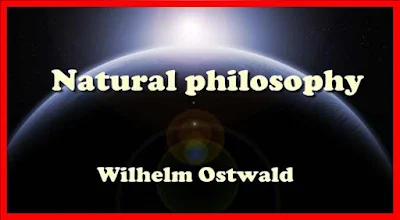Natural philosophy
Freface:
The beginning of the twentieth century is marked by a sudden rise in interest in philosophy. This is especially manifest in the vast growth of philosophic literature. The present movement, it is noteworthy, is by no means a revival proceeding from the academic philosophy traditionally represented at the universities, but has rather the original character of natural philosophy. It owes its origin to the fact that after the specialization of the last half-century, the synthetic factors of science are again vigorously asserting themselves.
The need finally to consider all the numerous separate sciences from a general point of view and to find the connection between one s own activity and the work of mankind in its totality, must be regarded as the most prolific source of the present philosophic movement, just as it was the source of the natural philosophic endeavours a hundred years ago. But while that old natural philosophy soon ended in a boundless sea of speculation, the present movement gives promise of permanent results, because it is built upon an extremely broad basis of experience.
The laws of energy in the inorganic world and the laws of evolution in the organic world furnish mental instruments for a conceptual elaboration of the material provided by science, instruments capable not only of unifying present knowledge but also of evoking the knowledge of the future.
If it is not permissible to regard this unification as exhaustive and sufficient for all time, yet there is still so much left for us to do in working over the material we have on hand from the general points of view just mentioned, the need for systematizing must be satisfied before we can turn our gaze upon things more remote. The present work is meant to serve as the first aid and guide in the acquisition of these comprehensive notions of the external world and the inner life. It is not meant to develop or uphold a "system of philosophy."
Through long experience as a teacher, the writer has learned that those are the best pupils who soon go their own way. However, it is meant to uphold a certain method, that is, the scientific (or, if you will, the natural sciences), which takes its problems, and endeavours to solve its problems, from experience and for the experience.
If, as a result, several points of view arise that differ from those of the present day, and consequently demand a different attitude toward important matters in the immediate future, this very fact affords proof that our present natural philosophy does not lead away from life, but aims to form a part of our life, and has a right to.
Some contents:
PART I
GENERAL THEORY OF KNOWLEDGE n
1. The Formation of Concepts n
2. Science 13
3. The Aim of Science 13
4. Concrete and Abstract 16
5. The Subjective Part 17
6. Empirical Concepts 18
7. Simple and Complex Concepts 19
8. The Conclusion 24
9. The Natural Laws 28
10. The Law of Causation 31
11. The Purification of the Causal Relation ... 34
12. Induction 38
13. Deduction 40
14. Ideal Cases 44
15. The Determinateness of Things 47
16. The Freedom of the Will 50
17. The Classification of the Sciences .... 53
18. The Applied Sciences 57
PART II
LOGIC, THE SCIENCE OF THE MANIFOLD, AND MATHEMATICS 61
19. The Most General Concept 61
20. Association 63
21. The Group 65

